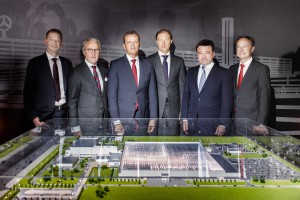
Daimler and Russian officials show off the model for the new Mercedes-Benz plant just outside Moscow.
As many automakers have been running away from the Russian auto market, a few others are moving into to expand their foothold in their absence. Daimler AG began construction of a new Mercedes-Benz plant near Moscow: the first new investment by a major foreign automaker in years.
The German maker is investing nearly $280 million into the new factory to build new Mercedes E-Class sedans starting in 2019 with the luxury brand’s GL class sport utility vehicles following afterward.
“Establishing a passenger car production in Russia is a strategic investment in an important sales market for Mercedes-Benz. We are extending our local footprint and, at the same time, strengthening our global competitiveness,” said Markus Schäfer, member of the Divisonal Board of Mercedes-Benz Cars, Production and Supply Chain, during the groundbreaking ceremony.
The Russian market has suffered in recent years due, in part, to sanctions on the country from Western countries. In 2012, sales in Russia were about 3 million units and automakers were scrambling to get to the top of the heap there.
(To see more about how Detroit’s Big Three are dealing with adapting to a global market, Click Here.)
Fast forward through years of sanctions and sales are now half of what they were then, and many automakers have cut back on – or completely halted – investment in the country. General Motors actually pulled up stakes and left in 2015.

Ford Executive Chairman Bill Ford said earlier this month the automaker is mulling an expansion of its operations in Russia.
“This change in our business model in Russia is part of our global strategy to ensure long-term sustainability in markets where we operate,” said GM President Dan Ammann at the time. “This decision avoids significant investment into a market that has very challenging long-term prospects.”
However, Mercedes isn’t the only automaker looking to make a go of it in Russia. Ford Motor Co. and its partner, Sollers, have maintained a strong presence in Russia. In fact, Ford Chairman Bill Ford said the company may be expanding in Russia.
“We still have a lot of plans in Russia. We didn’t pull out, as you know. We feel very good about our operation there,” he said.
(Click Here for details about Ford moving Focus to China.)
When asked whether the company is still mulling Russian-based production of components to be supplied to European markets, he said: “We’re still looking at it.”
While GM and others left the market, some companies are already looking to get back in.
Volkswagen AG recently extended its deal with AutoVAZ to produce Skoda cars in the country until 2025. Furthermore, the Volkswagen brand will in future supply 2.0 TDI engines for GAZ light commercial vehicles, opening up new business opportunities in international markets.
BMW is reportedly in talks with the St. Petersburg government about taking over a plant abandoned by the aforementioned when it left two years ago. That might be spurred by on by the Bavarian automaker’s aggressive effort to supplant Mercedes-Benz as the global luxury sales leader.
Though Mercedes’ Russian car sales dropped 11% last year to 36,888, according to the Association of European Business (AEB) lobby group, Schaefer said he expects numbers to show an increase in 2017 and continue growing after the new plant opens in 2019. Mercedes sales in Russia car sales in May jumped 8% year on year.
(Now at 83 and counting, Mercedes is flooding the market with new models. Click Here for the story.)
The new factory will employ more than 1,000 people and produce more than 20,000 Mercedes-Benz cars and SUVs a year.
